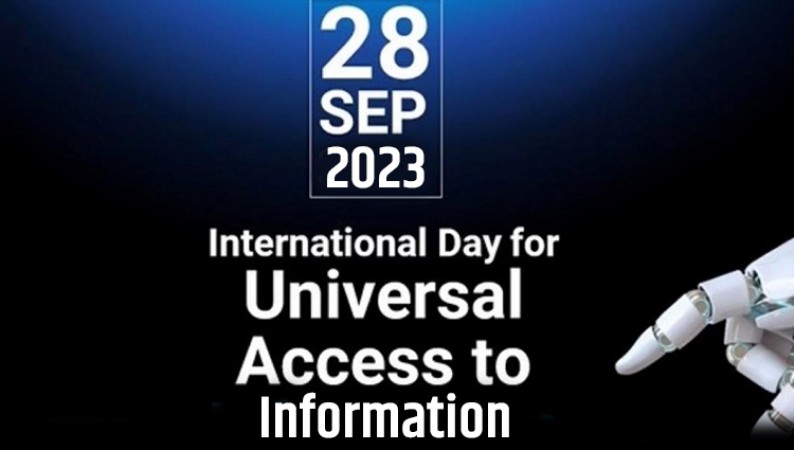
In today's fast-paced world, information is power. It shapes our thoughts, informs our decisions, and empowers us to navigate the complexities of our interconnected society. We live in an era where knowledge is at our fingertips, and the ability to seek, access, and share information has become a fundamental human right. International Right To Know Day, observed annually on September 28, is a celebration of this right and a reminder of its profound significance in our lives.
The History of International Right To Know Day
The roots of International Right To Know Day can be traced back to a UNESCO Conference held in 2002. It was during this conference that the idea of a day dedicated to promoting the right to access information was first discussed. Recognizing the fundamental role of information in fostering democracy, the conference laid the foundation for what would later become a global observance.
Over the years, the concept gained momentum and garnered support from international civil societies and organizations. It wasn't until 2012 that the day was officially celebrated by various countries and institutions worldwide. Its significance continued to grow, and in 2019, the United Nations General Assembly took a historic step by proclaiming September 28 as the International Day for Universal Access to Information (IDUAI).
The Significance of International Right To Know Day
International Right To Know Day holds immense significance in our information-driven world. It serves as a yearly reminder of the critical role that information plays in shaping our societies, empowering individuals, and fostering transparency and accountability. Here are some key aspects of its importance:
Empowering Individuals: In a world where access to information is readily available, individuals can educate themselves, make informed choices, and actively participate in civic and political processes. This empowerment is crucial for the functioning of a healthy democracy.
Transparency and Accountability: Access to information is a cornerstone of transparency and accountability in both public and private sectors. It allows citizens to scrutinize government actions, corporate practices, and other influential entities, holding them responsible for their decisions and actions.
Social Progress: The availability of information is a catalyst for social progress. It enables us to identify societal challenges, propose solutions, and monitor the progress of initiatives aimed at improving the quality of life for all.
Technological Advancements: International Right To Know Day acknowledges the role of technology in expanding our access to information. The internet, search engines, social media, and blogs have revolutionized the way we seek and share knowledge, making information more accessible than ever before.
Challenges to the Right To Know
While International Right To Know Day celebrates our access to information, it also highlights the challenges that persist in ensuring universal access. These challenges include:
Digital Divide: Not everyone has equal access to the internet and digital technologies. The digital divide, often linked to socio-economic disparities, can limit the ability of marginalized communities to exercise their right to know.
Censorship and Information Control: In some parts of the world, governments restrict access to information, control the media, and censor content. Such practices undermine the principles of freedom of expression and access to information.
Information Overload: In the age of information abundance, people can be overwhelmed by the sheer volume of data available. Distinguishing between credible and false information has become a significant challenge.
Privacy Concerns: While we have the right to access information, we also have the right to privacy. Balancing these rights is an ongoing challenge in the digital age, as issues of data privacy and security continue to evolve.
Promoting Universal Access to Information
International Right To Know Day serves as a call to action. It reminds us of our collective responsibility to promote and protect the right to access information for everyone. Here are some ways in which this can be achieved:
Advocacy: Civil society organizations, activists, and individuals can advocate for policies that support the right to know. This includes pushing for legislation that guarantees access to government information and transparency in corporate practices.
Education: Promoting media literacy and critical thinking skills is essential to help individuals navigate the information landscape effectively. Education empowers people to discern reliable sources from misinformation.
Digital Inclusion: Bridging the digital divide is crucial. Efforts should be made to ensure that everyone, regardless of their socio-economic status, has access to the internet and digital tools.
Open Data Initiatives: Governments and organizations can contribute to universal access by making data openly available in formats that are easily accessible and understandable.
Media Freedom: Protecting and supporting a free and independent media is vital. Journalists and media outlets play a pivotal role in providing accurate and reliable information to the public.
International Right To Know Day, celebrated on September 28, is a reminder of the power of information in our lives. It acknowledges our right to seek, access, and share knowledge as a fundamental human right that underpins democracy, transparency, and progress. While we celebrate the strides made in ensuring universal access to information, we must also remain vigilant in addressing the challenges that threaten this right. By advocating for policies that promote transparency, fostering media literacy, and bridging the digital divide, we can work together to uphold and strengthen the right to know for all. In doing so, we empower individuals, promote accountability, and pave the way for a more informed and enlightened world.